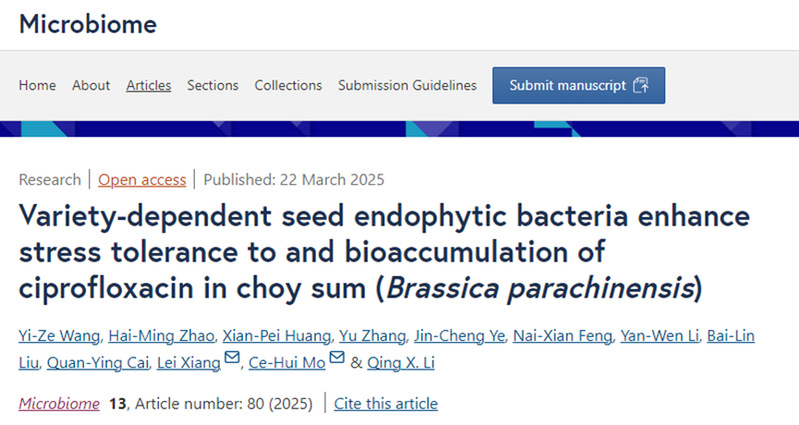- ABOUT JNU
- ADMISSION
-
ACADEMICS
- Schools and Colleges
-
Departments and Programs
- Arts College of
- Chinese Language and Culture College of
- Economics College of
- Electrical and Information Engineering College of
- Foreign Studies College of
- Information Science and Technology College of
- Environment School of
- Humanities School of
- International Business School
- International Studies School of
- Journalism and Communication College of
- Law School
- Liberal Arts College of
- Life Science and Technology College of
- Management School of
- Marxism School of
- Medicine School of
- Pharmacy College of
- Physical Education School of
- Science and Engineering College of
- Shenzhen Tourism College
- Research Institute
- Research Center
- Programs in English
- Majors
- Study Abroad
- Online Learning
- RESEARCH
- CAMPUS LIFE
- JOIN US
Latest News
Jinan University's Research Team Uncovers Mechanisms of Antibiotic Accumulation in Crops
Publisher: College of Life Sciences and Technology
Date: April 1, 2025
A groundbreaking study led by Professor Wei Weihui and Professor Xiang Lei from Jinan University has been published in the prestigious international journal Microbiome. This research investigates how endophytic bacteria present in seeds regulate the absorption and accumulation of antibiotics in crops via vertical transmission effects. The findings offer a new theoretical framework for understanding how crops interact with organic pollutants, providing crucial insights for the rational use of low accumulation crop varieties and beneficial microorganisms in the safe utilization of polluted farmland.

(Screenshot of the paper)
Study Background
The accumulation of antibiotics in crops presents significant risks to human health and the environment. However, the specific mechanisms by which microorganisms influence the uptake and accumulation of these antibiotics in plants are not well understood. This study aims to fill that gap by examining the role of seed-borne microbiota in the accumulation of ciprofloxacin (CIP), an antibiotic, in two varieties of choy sum.
Key Findings
The research utilized amplicon sequencing, multiple statistical analyses, and validation through isolation and co-culturing of key bacteria with plants to investigate these complex relationships. Significant findings include:
•Enrichment of Bacilli: The study showed that Bacillaceae, primarily Bacillus species, were specifically enriched in the roots of the high-antibiotic-accumulating variety (HAV) of choy sum through seed-based vertical transmission triggered by root exudate-derived maleic acid. The abundance of Bacillaceae was found to be 9.2 to 27.7 times greater in the HAV roots compared to the low-antibiotic-accumulating variety (LAV).
•Bacterial Community Dynamics: This enrichment supported a cooperative and beneficial microbial community formation through deterministic processes. The microbial community in HAV not only enhanced antioxidase activities and reduced lipid peroxidation but also stimulated growth, particularly in root length and biomass. This improved tolerance to CIP absorption was critical.
•Increased Ciprofloxacin Accumulation: The unique plant-microbial interactions in HAV led to a 1.6- to 3.2-fold increase in CIP accumulation in the shoots compared to those of LAV.
Significance of the Research
These findings emphasize the essential role of the seed-borne microbiota in modulating the uptake and accumulation of antibiotics in crops. By shedding light on plant-microbial interactions, this research offers a deeper understanding of how organic pollutants accumulate in plants, serving as a vital resource for future agricultural practices and environmental safety.
Research Team
Professor Wei Weihui and Professor Xiang Lei from the College of Life Science and Technology at Jinan University served as co-corresponding authors of the article. The study features contributions from Dr. Wang Yize and Associate Researcher Zhao Haiming as co-first authors. Additionally, guidance was provided by Professor Qing X. Li from the University of Hawaii. The research was supported by several prestigious funding sources, including the National Natural Science Foundation of China Key Project and other provincial talent initiatives.
For those interested, the full paper can be accessed https://doi.org/10.1186/s40168-025-02073-2.
NEWS
- About the University
- Quick Links
Copyright © 2016 Jinan University. All Rights Reserved.




